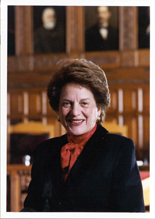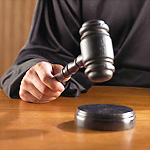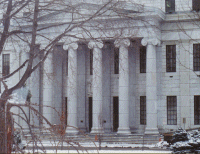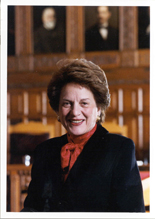 New York’s Chief Judge Judith Kaye has abandoned her previous threat of a lawsuit against the legislative and executive branches for the failure to grant even a cost-of-living pay raise over the last nine years.
New York’s Chief Judge Judith Kaye has abandoned her previous threat of a lawsuit against the legislative and executive branches for the failure to grant even a cost-of-living pay raise over the last nine years.
In a letter to the judiciary over the past holiday week, Chief Judge Kaye, pictured at right, backed down. In an unsigned, four page letter marked “Confidential,” she wrote that any such lawsuit by the Third Branch of government against the other two “must withstand the strong light of day,” and that formulating an appropriate theory has “not be an easy task.” The judge added that had such a suit already been brought, it would not “have helped us one whit” and “it would have damaged our cause.”
How did this confidential letter come to light? Because sitting Justice Emily Jane Goodman of Manhattan has now written about it, publishing both the Chief Judge’s letter and her own response online in an exclusive report at Judicial Reports. And Justice Goodman wants to know why, if such a suit would not have been helpful or couldn’t be brought, was the threat so publicly made?
Justice Goodman, using an extraordinarily sharp tone considering her target, and often dripping with sarcasm that attorneys are unaccustomed to hearing from the bench, is anything but kind to Chief Judge Kaye. A few snippets of of Justice Goodman’s response:
The Chief Judge writes that she understands my “mounting frustration,” though I suspect she will find it unseemly when I, a New York State Supreme Court Justice, am forced into bankruptcy. She’s assuring me that our problems with the Governor and Legislature are not unique in the nation; but show me one other judicial entity in its ninth year without a pay raise or cost of living increase.
…
Yet all is not lost. They are “doing something,” and, “please be assured that we are wholly dedicated to achieving our objectives and unrelenting in our daily calls and visits.” Calls and visits are sweet, but have little to do with the urgency felt by those of us who are losing control of our lives.
I’m sure the Chief Judge believes that these contacts will do the trick. But, by the way, she and the other administrators have never been elected, have never run for office or been touched by politics, in a way that would enable them to understand politics and political negotiation. Those who are appointed are the beneficiaries of politics, without experiencing the dynamics themselves. Almost all court administrators (I can think of few exceptions) are appointed, and almost none have ever been elected to the Supreme Court.
There is much more at the Judicial Reports link above.
The publication of the confidential letter and the sharp commentary accompanying it, has the sound of an insurrection against Chief Judge Kaye from the ranks of our trial judges, if others feel as betrayed as Justice Goodman. And it is possible that, if the trial judges don’t see acceptable action from their leadership or the legislature, that a work “slow down” may be in the future.
Addendum 7/15/07: See also A Bold Move By Justice E.J. Goodman (Simple Justice)
(Eric Turkewitz is a personal injury attorney in New York)



